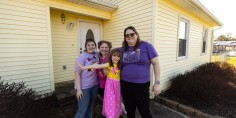At the South Carolina Youth Advocate Program in Columbia, it seems the phones are always ringing. CEO Lex Cole has a simple explanation for why: “We’re always busy.”
Connecting Children to Quality Foster Care
The organization, established in 1990, provides programs and services to vulnerable young people and families dealing with difficult issues and crises. It focuses on out-of-home, specialized foster care, as well as non-residential, community-based services.
The goal is to help children who have been traumatized lead a normal, productive life.
“Some of the kids we work with have been abused beyond imagination,” says Lex, who joined the organization in 1997. “These kids deserve more. That’s why we put so much effort into what we do every day.”
Lex grew up in New York, but moved to South Carolina for college and never left. He has embraced the South, and even wears flip flops to the office on sultry days. He wants to create a relaxed atmosphere for his hard-working staff.
He started his career as an addictions counselor, and then worked for 10 years in the Medicaid program with the S.C. Department of Health and Human Services.
We’re trying to make sure that the number of children we turn away gets smaller and smaller. That means strengthening families on the front end before a crisis.
Lex Cole, CEO at South Carolina Youth Advocate Program
At South Carolina Youth Advocate Program — known as SCYAP — he’s leading efforts to recruit and retain foster families and license more foster homes so that children have access to the best services and care. In 2015, The Duke Endowment awarded a $750,000 grant to support the work.
Families will be trained using Together Facing the Challenge, an evidence-informed model designed to help foster parents build skills to improve outcomes for youth. Developed at Duke University School of Medicine, it’s based on nine years of studies. In a 5‑year randomized clinical trial, Together Facing the Challenge showed significant improvement in a range of outcomes. A second randomized trial, funded by the Endowment, is focused on the coaching that agencies provide.
The need is great. With more than 4,200 youth in care, South Carolina’s DSS has only 1,600 licensed foster families.
For children needing critical services, the shortage may mean spending a night in a social worker’s office, being housed temporarily in a hotel, or being placed at a level of care that doesn’t meet their needs. A larger pool of foster homes will also help siblings stay together.
“We’re trying to make sure that the number of children we turn away gets smaller and smaller,” Lex says. “That means strengthening families on the front end before a crisis — and, when state custody is needed, ensuring that the best programs and services are in place for every child who needs them.”







